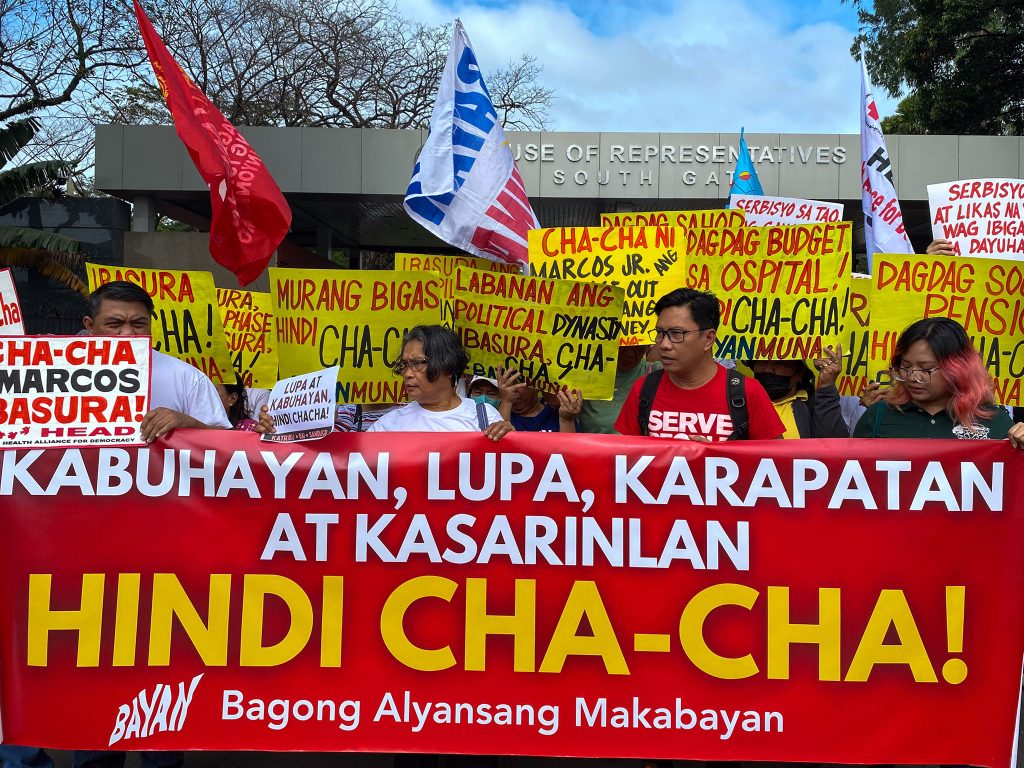
DAVAO CITY, Philippines – Progressive groups who have long battled moves by elected officials for charter change said this Sunday’s protest against cha-cha led by Duterte supporters in Davao does not make the Dutertes stand as a credible opposition.
“Zero credibility,” says lawyer Dexter Lopoz, spokesperson of the Union of Peoples’ Lawyers in Mindanao. “It’s a desperate attempt of these pro-Duterte people to hold on to power.”
Congressman Paolo Duterte, son of former President Rodrigo Duterte, earlier called out the people’s initiative signature campaign in Davao City, with allegations of bribery. This has prompted Duterte supporters to stage a protest rally last week and this coming Sunday.
Lopoz believes the Dutertes’ opposition is based on their falling out from the Uniteam coalition with President Ferdinand Marcos, Jr.
Majority of the House of Representatives is supporting the people’s initiative in a bid to push amendments in the Constitution to open foreign investors to own properties and businesses in the country.
But Lopoz believes the push for charter change is meant for the Marcoses to stay longer in power, which leaves out the Dutertes, who are expecting Vice President Sara Duterte to run for the presidency in 2028.
The human rights lawyer points out that former allies of Duterte in the Davao Region have shifted alliance to Marcos and House Speaker Martin Romualdez.
“The Uys and Zamoras of Davao de Oro were rabid Duterte supporters and pillars of Sara’s HNP (Hugpong ng Pagbabago). But they all sided with the Marcos-Romualdez camp already,” Lopoz said.
“Sara and her cabal are now seeing that the House of Representatives is an even bigger snake pit that right after Duterte was out of power, as all allegiances shifted instantaneously to the Marcos-Romualdez camp,” he added.
“Gapaling-paling”
Another difference that progressive leaders point out between them and the Dutertes is consistency.
“It’s funny for Duterte to now champion the protection of farmers to oppose amendments to the economic provisions of the 1987 Charter on foreign ownership of lands when during his time, he advocated for the Chinese to own lands in the Philippines and to also revise the charter to usher in ‘federal-federal,” Lopoz said.
The former president pushed for a constitutional convention in 2017 to adopt a federal form of government, but only to have the Senate object to how Congress should vote.
“Gapaling-paling (vacillating)” is how Doctor Jean Lindo, spokesperson for Gabriela – Davao, describes the Duterte’s stand on cha-cha.
“They opposed it when the late Speaker (Prospero) Nograles pushed for it during the time of GMA (Gloria Macapagal Arroyo in 2000s). But when he was in power, he wanted it.”
Disempowering cha-cha
Lindo explained that her group and other progressives such as Bayan consistently oppose charter change as they see the interests carried by the proponents affect the nation’s resources and people’s welfare.
“Our context is different from theirs. Historically we were against it because we foresee problems. We see the implications of constitutional change, it is very dis-empowering for the already marginalized sectors,” Lindo said.
House members and even President Marcos Jr are pushing for charter change to lift restrictions on foreign ownership of businesses and properties.
“On top of it all is economics. It’s resource control. The world’s rulers have no sense of stewardship of the natural resources. They act as agents. And the Philippines is not an exception to this kind of setup,” the Gabriela leader explained.
Cha-cha proponents in the past have also pushed for political reforms such as changing term limits or shifting to a parliamentary form of governance.
“This move would shrink the democratic space because (under the parliamentary system), Congress would decide for the citizens. Silay magbuot (They will decide) for their constituency. We know that there is no genuine interest to dismantle political dynasties. They will just replace or cancel each other but the dynasties stay,” Lindo points out.
She also points out that the 1987 Constitution championed representation through the party-list system, where marginalized groups get to push their agenda and do check and balance as Gabriela and allies in the Makabayan bloc did in checking the confidential funds.
“This widened the democratic space because those with genuine organizing were able to participate in the electoral arena and were able to mainstream the issues of the marginalized,” she said.
Progressive groups have staged their own protests across the regions, as they raise their call for government officials to look into addressing poverty alleviation. (davaotoday.com)
charter change, davao city, duterte, marcos, philippines









